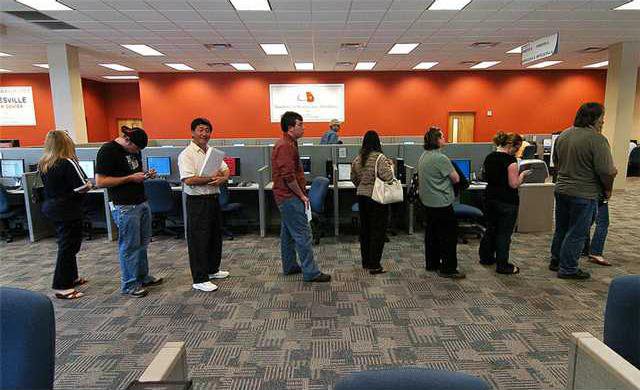It’s hard for Danny Elrod to believe the recession is over.
The 45-year-old Dawsonville man has been out of work since November, when he lost his job as an auto detailer in Cartersville. He graduated from truck-driving school in March, but in a fiercely competitive job market, no one wants to hire him without experience.
So when the economists and experts say that technically, the recession is over, it is tough for Elrod to swallow.
"To me it’s not," Elrod said, sitting at a computer in the Hall County offices of the Georgia Department of Labor, hunting for a job. "The way I look at it, this recession is not over, it’s getting worse."
Indeed, the employment picture in Georgia is expected to grow even more grim before it improves. While the rate of new jobless claims has slowed, the state unemployment rate is expected to increase from the current 10.2 percent to 11.5 percent by the middle of 2010, said Jeff Humphreys, an economist at the University of Georgia and director of the Selig Center for Economic Growth.
Humphreys said Georgia lost 302,000 jobs since the beginning of the recession and expects the final toll to be about 350,000 before sustained job growth begins sometime in the second quarter of 2010. It will take as long as four years for Georgia to recover all the jobs it lost, he said.
Still, the recovery from recession, which Humphrey’s believes ended in July, has slowly begun.
A recession is generally defined as two or more quarters in which the economy experiences negative growth. By that definition, the nation’s third-quarter economic growth of 3 percent means the recession is over.
Federal Reserve Chairman Ben Bernanke said in mid-September that he believes the recession has ended and a slow recovery has begun, and most economists agree.
There is, however the chance that the growth would not continue, with the country falling back into a "double-dip" recession.
Local business owners share that fear.
"To be honest, I can’t trust anything right now," said Missy Dimo of Dimo Fine Jewelry, who has seen a slight uptick in business in the last two or three months and heard other retailers say the same. "It could get worse in a couple of months. I think we have to wait at least until the end of the year to see."
Humphreys, while optimistic that growth will continue, albeit at a slower pace, believes there is about a 20 percent chance "that things (could) fall apart," with the main risk being in banks and financial markets.
Humphreys expects growth in fourth quarter production to be about half what it was in the third quarter, but it will be more broadly-based. He credits much of the recent economic growth to "couponing programs," primarily the "Cash for Clunkers" federal stimulus that gave automotive sales a big boost, and an $8,000 tax credit for first-time homebuyers.
Cash for Clunkers is over and the tax credit is set to expire Nov. 30, though there is talk in Washington of extending it.
"That’s helped the recovery of the single-family housing industry," said Humphreys, who believes the housing recession ended in the first quarter of 2009.
Kerstin Crawford, managing broker for Jack Waldrip Real Estate, said Realtors have seen improvements for the last three or four months in housing, though commercial sales remain stagnant.
"It’s going to take a while, but it is improving," Crawford said of the real estate market. "I’m just hoping we’ll steadily continue to grow. I don’t think we’ll ever be at our 2005-06 levels; we’ll just have to redefine normal."
Indicators on the local level that times are getting better are small, but they are there.
At Luna’s restaurant in downtown Gainesville, Juan Luna has seen slight improvements in his dining and catering business, which reached a low point at the first of the year. Bar business remains slow, but restaurant traffic has picked up in recent months, he said.
"People are holding onto their money, they are more cautious with their spending," Luna said.
Indeed, consumer confidence is still somewhat frigid, Humphreys believes, with a weak labor market and a massive loss of wealth during the recession.
Nationally, consumers lost about $14 trillion in household wealth, 22 cents of every dollar they saved over their lifetime, Humphreys said.
"Consumers are not really in any position to lead the way in the recovery," he said.
Consumer spending has grown by perhaps 1 percent in recent months, which is better than the negative growth of the first quarter of this year.
"Consumer spending is positive, but it’s a very small positive at this point," Humphreys said. "We’re seeing really small gains right now, but nothing to brag about."
The real growth will be in production of inventory that may have been over-liquidated during the recession, with a faster-growing global economy helping exports, Humphreys said. He also believes much of the economic impact of federal stimulus spending has yet to be felt.
Georgia, which was hit harder during the recession because of a state manufacturing economy closely tied to the housing industry, should not underperform in the recovery as it did during the recession, Humphreys said. But it will take a while. He doesn’t look for normal rates of sustained economic growth at the 3 percent range until sometime in 2012.
"It’s going to be a slow recovery," Humphreys said. "It’s going to be slow and bumpy."
Restaurateur Juan Luna has faith in a recovery, however long it takes.
"I think once (customers) start getting their confidence back, business will be back to normal," Luna said. "And it will be back, I have confidence."

